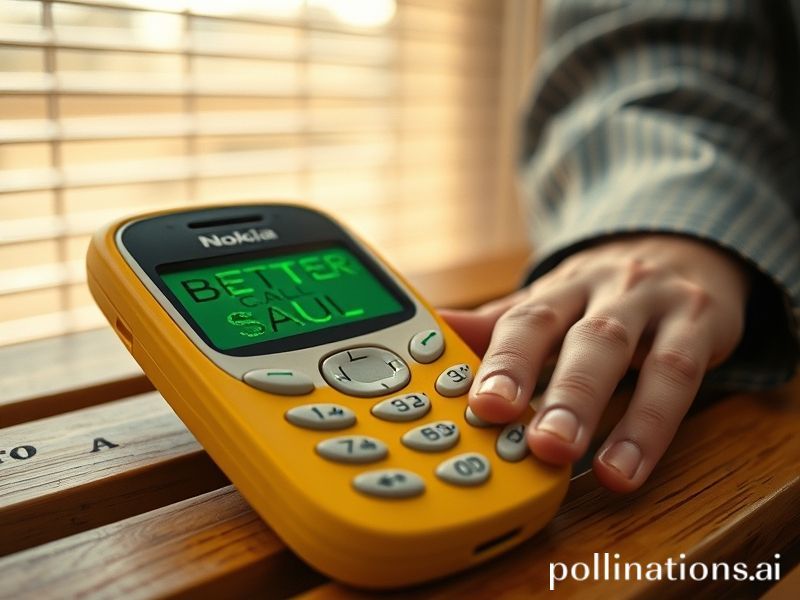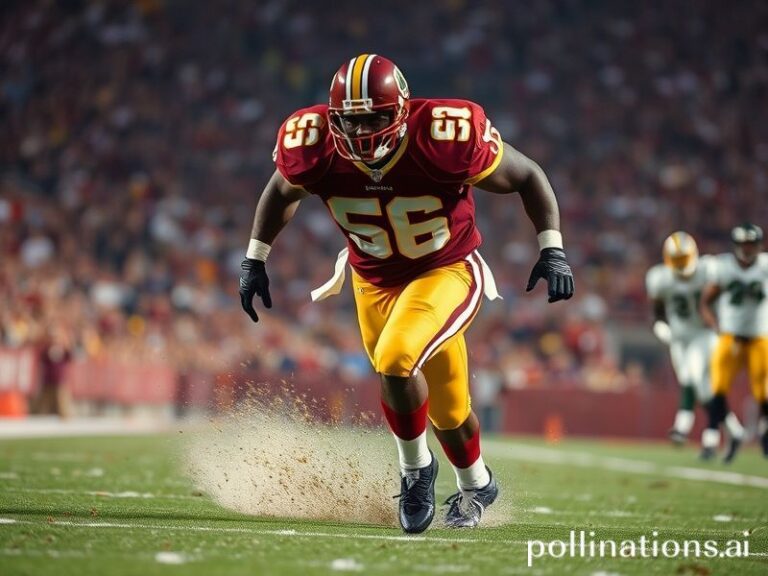Better Call Saul: The Global Masterclass in Moral Flexibility and Branding
Better Call Saul, or How to Launder Your Reputation in Six Languages and a Fake Mustache
By Our Correspondent Somewhere Over International Waters
When the final credits rolled on Better Call Saul last year, the collective sigh of relief from global streaming services was almost loud enough to drown out the hum of crypto-mining rigs in Kazakhstan. After six seasons, one spin-off, and roughly the GDP of Paraguay spent on montage rights, the world finally learned the moral of the tale: if you’re going to be a con artist, at least be photogenic. From Lagos living rooms to Reykjavik bunkers, audiences discovered that Jimmy McGill’s slide into Saul Goodman is less a cautionary spiral than a LinkedIn masterclass in personal branding.
Let’s zoom out, shall we? While American viewers argued over whether Kim Wexler deserved better, European regulators were busy drafting guidelines on “ethical anti-heroes” for public broadcasters. The EU’s Audiovisual Services Directive now contains a footnote—really—warning member states that charismatic scoundrels must be balanced with at least 12% screen time for “consequences” and “existential dread.” France, naturally, already exceeds the quota; Germany is lobbying to classify Saul Goodman as a hate crime.
Meanwhile, in Southeast Asia, bootleg Saul Goodman business cards circulate faster than the latest COVID sub-variant. Bangkok street vendors sell knock-off “World’s 2nd Best Lawyer” mugs alongside bootleg NFTs of Chuck McGill’s space blanket. Analysts at Singapore’s sovereign wealth fund quietly note that the show’s depiction of elder-law scams has done wonders for their portfolio of retirement-home surveillance start-ups. Nothing says “soft power” like exporting geriatric paranoia.
The Middle East tuned in for the sandpiper-crossing scenes and stayed for the moral ambiguity. Saudi commentators praised the meticulous paperwork; Iran’s state TV censored every shot of a woman holding a briefcase, but left in the money-laundering montages—priorities, people. In Tel Aviv, Mossad recruiters reportedly use Saul’s burner-phone etiquette as a training module; the syllabus is classified, but rumor has it the pass phrase is still “Gimme Jimmy!”
Down in Latin America, cartel middle-managers binge the show like it’s a TED Talk. Colombian underbosses now insist on German-engineered coffee machines in every safe house, a direct homage to Gus Fring’s Los Pollos Hermanos. Mexico’s National Banking Commission reports a 37% uptick in nail-salon shell corporations since Season 3—a coincidence the Commission’s spokesperson calls “statistically adorable.”
And then there’s Sub-Saharan Africa, where bandwidth is expensive but moral relativism comes free with every data bundle. Kenyan TikTok lawyers reenact Saul’s courtroom theatrics to drum up personal-injury clients; their tagline is “Sue like Saul—terms and miracles apply.” In Lagos, an enterprising pastor has franchised a Sunday sermon series titled “Seven Habits of Highly Effective Sinners,” complete with communion wafers shaped like miniature Statues of Liberty. The collection plate, I’m told, accepts dollars, naira, and untraceable crypto.
All of which proves what we’ve suspected since dial-up: human nature is delightfully portable. Give the planet a morally flexible protagonist, a color-coded suit, and a catchphrase, and we’ll weaponize it faster than you can say “class-action lawsuit.” Better Call Saul isn’t just prestige TV; it’s a Rosetta Stone for grift, a Rosary for rationalizers, and—if Netflix’s Q4 earnings call is to be believed—a better export than democracy.
So as Jimmy McGill shuffles off to that Cinnabon in Omaha—Nebraska being the Switzerland of witness protection—rest assured his legacy lives on in every encrypted messaging app, every offshore shell company, every LinkedIn profile that lists “Disruption Evangelist” under skills. The world has learned the lesson: if you can’t beat the system, rebrand it. Just remember to smile for the security camera and keep your paper shredder oiled. After all, in the immortal words translated into seventeen languages and counting:
“Don’t drink and drive, but if you do—call me.”







